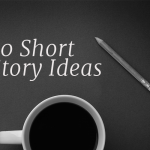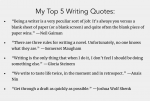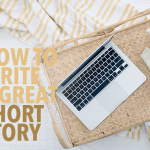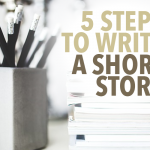10 Short Story Ideas for 2023

Use these ten short story ideas to write your first ten stories, one per week, over the next ten weeks. I promise you, you’re life will look totally different if you do it.

Use these ten short story ideas to write your first ten stories, one per week, over the next ten weeks. I promise you, you’re life will look totally different if you do it.

Sometimes, as a writer, it’s nice to not feel alone. After all, writing can be hard, lonely work. Even if you have supportive friends and family, no one can understand what it’s like to be a writer except for other writers. A good writing quote at the right time, especially from one of your favorite […]

In the last year, I’ve read about 500 short stories, most of them while judging the Show Off writing contest for my website, thewritepractice.com. In that time, I’ve learned some interesting things about the form and what makes a good story.
Here are a three tidbits of advice for you short story writers.

When you submit a short story to a literary magazine, the editors expect your story to be formatted in a very particular way. Before you submit, make sure to follow the following guidelines…

We don’t want to just write short stories. We want to write short stories that people want to read, stories that are deep and realistic, stories that draw us into a person’s life and allow us to experience something wholly new.
In other words, we want to create art.
How do you write a short story that comes from inside of you, something only you could write?

Edgar Allen Poe said, “A short story must have a single mood and every sentence must build towards it.”
However In Let’s Write a Short Story I wrote, “Besides length, one of the major things distinguishing short stories from other literary forms is they usually feature one major event.” I was arguing that most, if not quite all, short stories revolve around a central event, an event that provides most of the story’s meaning and creates a transformation in the protagonist.
So which is it? Are stories structured according to mood or transformative incidents? And when you’re writing a short story, do you need to have an event or a mood in mind before you begin?
Let’s find out shall we?

How do you write a short story? How is writing a short story different than writing a novel?
These are tough questions to answer because there are as many types of short stories as there are types of novels. There are long short stories, short short stories, simple short stories, and complex short stories.
Still, if you want to write a short story, here are five steps to help you get started…

Writing short stories is different than writing novels. Many authors are nervous about writing short stories because they’re not sure how short stories differ from novels.
Like all forms, short stories have their own unique rules. However, the rules for writing short stories are not difficult to master.
Here are three ways short stories are different from novels…
“This book is an excellent primer for those wondering where to start developing their writing talent. Painless and simple, let Joe’s book walk you through the world of the short story and motivate you to pen a weekly tale, teaching you to take baby steps then more as you become a writer of substance.
—C. Hope Clark, fundsforwriters.com and author
“We all need a good kick in the pants once in a while!”
—Beck Gambill, writer
“Joe Bunting presents a well-organized, thoughtful guide filled with tips that all writers will find useful.”
—Elizabeth S. Craig, bestselling author, Mystery Writing is Murder
“If I were alive, I would read this book.”
—Ernest Hemingway, author
“Makes me want to start a new story right now!”
—C. S. Lakin, author, writing coach, livewritethrive.com
“Joe’s book is both a manifesto and manual for cultivating a solid body of work. It’s become the first resource I recommend to aspiring fiction writers.”
—Keith Jennings, author & artist